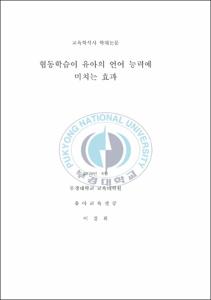협동학습이 유아의 언어 능력에 미치는 효과
- Alternative Title
- The Effects of Cooperative Learning on Children's Linguistic Competence
- Abstract
- This study was performed to examine the effects of cooperative learning on children's linguistic competency based on the academic curriculum with 'Cooperative Learning Model for Young Children.' The dependent variable of linguistic competency was divided by linguistic comprehension ability and linguistic expression ability, and following questions are developed in order to prove the practical effects of cooperative learning.
[Question1] Will cooperative learning improves young children's linguistic comprehension ability?
[Question2] Will cooperative learning improves young children's linguistic expression ability?
The subjects of the experiment consisted of a total of 50 4-year-old chilrdren from Y kindergarten in Busan, and 25 children were assigned to experimental group and the other 25 children were comparative group. Two teachers from the kindergarten participated in the experiment. The whole experiment was preformed total 18 times in six weeks from 4th November 2009 to 11th December 2009. The both group used the same subject of academic curriculum. The experimental group performed cooperative learning during the experiment, and the comparative group performed typical individual-learning method.
The experiment used the linguistic-ability test developed by Jang Young-ae(1981); edited by Park Ae-ja(1996) and used by Kim Gi-hyun(1994) & Gil Shin-Hee(2009). The test also was edited for the environment of the kindergarten. The treatment of experiment was performed 18 times, three times a week for total six weeks. The children in the experiment group participated in the experiment playing in the part of making and telling stories. The test was performed in two sections of linguistic comprehension ability and linguistic expression ability.
The result of this study is as following:
First, the experimental group which performed the academic curriculum with cooperative learning model got higher scores in categories of linguistic comprehension ability compared with the comparative group. After testing linguistic comprehension ability through answering questions, choosing appropriate pictures, and ordering in sequence, the children in experimental group showed the results closer to the answer of inspectors. especially in all subcategories: the number of vocabularies, the number of sentences, and agreement of contents.
.Second, the experimental group which performed the academic curriculum with cooperative learning model made a meaningful difference in categories of linguistic expression ability. After testing linguistic expression ability through making stories watching pictures and making connected stories, the experimental group got higher scores in the subcategories with the number of words, connection of contents, and creative expression compared with the comparative group. However, the scores of the number of sentences for both group were in the range of predictable variance. Therefore, this experiment proved that Cooperative Learning Model for Young Children generally improves young children's linguistic competency.
the result of this study proved that learning with cooperative learning model affects positively in learning of young children. It also suggests that the cooperative learning model used in this study not only improves linguistic ability of young children, but also shows the possibility of improvement in other abilities of young children.
- Issued Date
- 2010
- Awarded Date
- 2010. 8
- Type
- Dissertation
- Publisher
- 부경대학교
- Alternative Author(s)
- Kyung-Hee Lee
- Affiliation
- 부경대학교 교육대학원 유아교육과
- Department
- 교육대학원 유아교육전공
- Advisor
- 이정화
- Table Of Contents
- Ⅰ. 서론 1
1. 연구의 필요성 및 목적 1
2. 용어의 정의 6
3. 연구문제 7
Ⅱ. 이론적 배경 9
1. 협동 학습 9
가. 협동학습의 개념과 원리 9
나. 협동학습 모형의 종류와 특징 11
다. 이수련(2008)의 유아를 위한 협동학습 모형 19
라. 협동학습의 효과 24
2. 언어능력 25
가. 언어 이해력 27
나. 언어 표현력 29
3. 유아의 언어활동과 협동학습 30
Ⅲ. 연구방법 35
1. 연구 대상 35
2. 연구 설계 36
3. 연구 도구 36
가. 언어능력 검사도구 36
나. 검사의 평가 준거 41
다. 검사의 신뢰도 42
4. 연구 절차 43
가. 실험자 선정과 훈련 43
나. 검사자 훈련 및 사전검사 실시 43
다. 협동학습 실시 44
라. 사후 검사 48
5. 자료 분석 48
Ⅳ. 연구 결과 49
1. 협동학습이 유아의 언어이해력에 미치는 영향 49
2. 협동학습이 유아의 언어이해력에 미치는 영향 50
Ⅴ. 결론 54
1. 논의 및 결론 54
2. 제언 57
참고문헌 58
부 록 65
- Degree
- Master
- Files in This Item:
-
-
Download
 협동학습이 유아의 언어 능력에 미치는 효과.pdf
기타 데이터 / 4.72 MB / Adobe PDF
협동학습이 유아의 언어 능력에 미치는 효과.pdf
기타 데이터 / 4.72 MB / Adobe PDF
-
Items in Repository are protected by copyright, with all rights reserved, unless otherwise indicated.